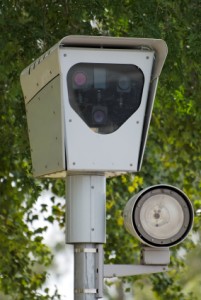Speed Cameras: Law Enforcement Without the Officer
Keeping a lookout for police cars won’t necessarily save you from a speeding ticket anymore, now that speed cameras are becoming popular.
Speed cameras have been around for quite some time so their use in detecting speeders is nothing new. But, the newest and most technologically advanced generation of speed cameras are capable of being mounted in a fixed position to catch and photograph speeders. They do not need to be staffed with an officer and they work 24 hours a day.
They are also causing a lot of controversy.
What Are Speed Cameras?
Speed cameras are exactly what they sound like, cameras that take pictures of you speeding. When speed cameras detect that you are over the speed limit, they take a picture of you and your vehicle. The picture will include the face of the driver, and collects enough information on the vehicle to be able to identify it and the owner.
Once the ticket is processed it is mailed to the owner of the vehicle. If you were not the one driving and are not in the picture as the driver, it is still your responsibility to provide proof of your innocence. You can defend yourself by requesting a hearing and then challenging that you were not the driver that was in the speed camera’s photo.
How do Speed Cameras Detect Speeding?
The two most popular speed cameras that are in use by law enforcement today detect your speed from point A to point B. Some speed cameras require sensors at point A and point B to be placed in the road for the camera to be tripped as a speeding car goes by.
Other speed cameras use a mathematical approach. They use the calculated average speed by knowing how far apart point A and point B are and then calculating how long it takes you to move between the two points.
As you can see both types of speed cameras operate pretty much the same, one is just a little more technologically advanced than the other.
How Do Speed Camera’s Affect My Insurance?
Getting a speeding violation in the mail is no different than getting one directly from a police officer. You still have the option of just paying it or requesting a hearing. Just because it was given by a computer doesn’t change the process.
If the violation ends up on your driving record, you can be sure to see an increase in your insurance rates just like with any other speeding ticket. Of course, the increase very heavily depends on your insurance company and how many other violations you have on your driving record. Some insurance companies forgive the first violation so if this is your first you wouldn’t see an increase, if your insurance company does this.
Too many of these speeding tickets will send you to the land of high-risk insurance where there is little forgiveness.
The Speed Camera Controversy
Speed cameras are in much higher use in Europe than they are here in the United State at this time. The people in Europe hate them and they are getting the same sentiments here in the states. Even city and state governments can’t make up their mind to use them or not. Some states like Arizona started using them, then stopped and now have started using them again.
The controversy behind these cameras is that people complain that they are not accurate, they are a violation of our constitutional rights and also that it is all a big money making scam to get more tax payer money.
Whether or not these are legitimate arguments against speed cameras is not for us here to say.
Trackback from your site.


Reviews (2)
Christopher Holmes
| #
I’m not really convinced that speed cameras decrease traffic fatality, yes in some way they are. But on my opinion this device doesn’t really makes sense that much. In a small spot, yeah it can monitor speed and people will tend to slow down or maintain an average but after passing along the speed camera detector, who knows what?
Reply
Michele Griffin
| #
Your right, the people that know that they are there are more likely just to slow down for the camera and then speed up again. But, that’s no different than seeing a cop sitting on the side of the road and doing the same thing. The difference is that the camera is there 24 hours a day to track speeders.
Reply